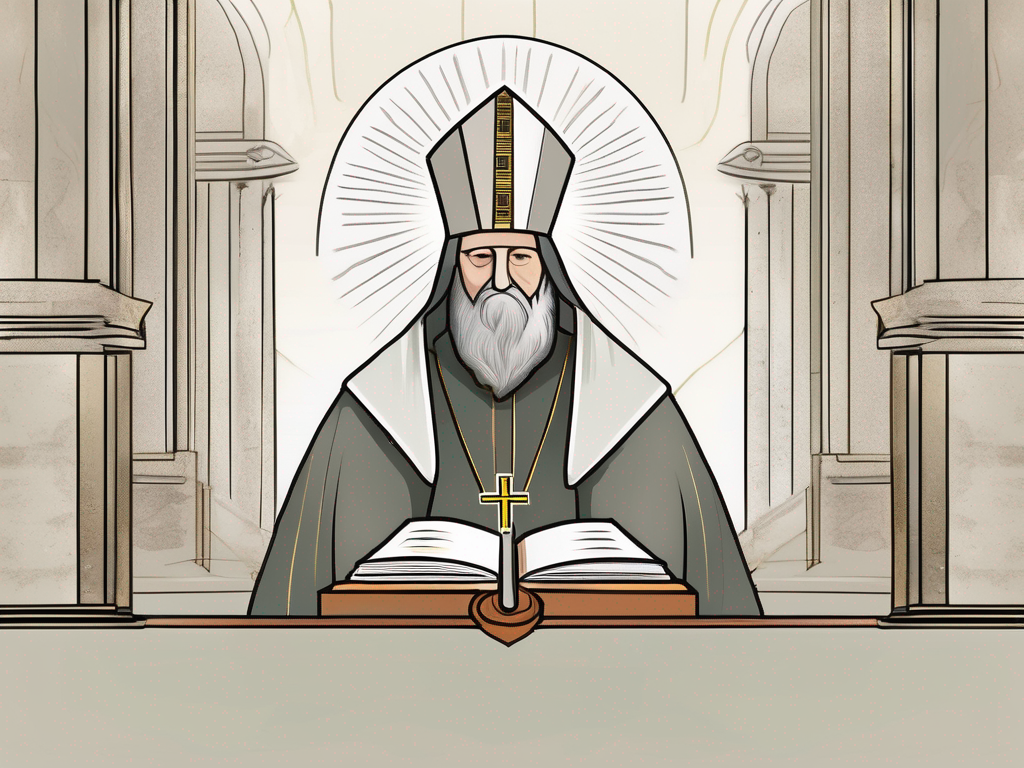Saint Cyprian of Carthage, also known as Thascius Caecilius Cyprianus, was a prominent figure in the early Christian Church. His life and teachings continue to inspire believers today. Let’s delve into the fascinating journey of this remarkable saint.
Early Life and Conversion to Christianity
Born in the third century in the city of Carthage, Cyprian was raised in a wealthy and influential family. Although specific details of his childhood are scarce, it is believed that he received an excellent education and had a privileged upbringing.
However, it was during his adulthood that Cyprian experienced a spiritual awakening that would change the course of his life. After a period of searching for meaning and purpose, he encountered the teachings of Christianity. The profound message of love, forgiveness, and salvation struck a chord within his heart, prompting him to embrace the faith.
Birth and Early Years
As a young child, Cyprian was known for his curiosity and quick intellect. He exhibited a natural ability to grasp complex concepts, a trait that would serve him well in his future endeavors.
From an early age, Cyprian displayed a strong sense of empathy and compassion towards others. He often went out of his way to help those in need, embodying the principles of kindness and generosity that are central to the teachings of Christianity.
His parents, recognizing his intellectual potential, provided him with the best education available. Cyprian eagerly absorbed knowledge from various disciplines, including literature, philosophy, and rhetoric. His insatiable thirst for learning propelled him to excel academically, earning him a reputation as a brilliant scholar.
Despite his privileged upbringing, Cyprian remained grounded and connected with the common people. He frequently visited the less fortunate neighborhoods of Carthage, spending time with the impoverished and offering them words of encouragement and support. His genuine concern for the well-being of others endeared him to the community, making him a beloved figure in Carthage.
Spiritual Awakening and Conversion
It was during his adult years that Cyprian experienced a profound spiritual transformation. Despite his privileged upbringing, he felt a deep sense of emptiness and dissatisfaction with the materialistic pursuits of the world.
Seeking answers to life’s existential questions, Cyprian turned to various philosophical and religious beliefs. He engaged in intense debates and discussions with scholars and philosophers, exploring different schools of thought in his quest for truth.
However, it was when he encountered the teachings of Christianity that everything clicked into place. The message of love, forgiveness, and redemption resonated deeply within his soul, leading to his conversion to Christianity.
Cyprian’s conversion was not without its challenges. His newfound faith brought him into conflict with his family and the societal norms of the time. Yet, he remained steadfast in his convictions, willing to endure persecution and ostracization for the sake of his beliefs.
Embracing his role as a Christian, Cyprian dedicated himself to studying the scriptures and deepening his understanding of the faith. He sought guidance from seasoned theologians and immersed himself in prayer and contemplation.
As his knowledge and spiritual insight grew, Cyprian became a prominent figure in the Christian community. He was known for his eloquent sermons, which captivated audiences and inspired them to live virtuous lives. His teachings emphasized the importance of love, compassion, and unity among believers, fostering a sense of community and strengthening the early Christian movement.
Cyprian’s conversion to Christianity not only transformed his own life but also had a profound impact on the people around him. His unwavering commitment to his faith and his tireless efforts to spread the message of Christianity left an indelible mark on the history of the Church.
Ascension to Bishop of Carthage
After his conversion, Cyprian’s dedication and fervor for his newfound faith quickly became apparent to those around him. Recognizing his profound spiritual insight and leadership abilities, the local Christian community elected him as their bishop.
Cyprian’s election as Bishop of Carthage was a momentous occasion that marked the beginning of a new chapter in his life. As he assumed this esteemed position, he embraced the weight of responsibility that came with it. With humility and determination, he set out to fulfill his duties as a shepherd of the faithful.
Election and Ordination
The election and subsequent ordination of Cyprian as Bishop of Carthage marked a significant milestone in his life. This position granted him considerable influence and authority within the Church, allowing him to guide and shepherd the faithful.
As Cyprian stood before the congregation, his heart filled with gratitude and awe. He understood the immense trust that had been placed in him, and he vowed to serve the community with unwavering dedication. With the laying on of hands and the prayers of the faithful, Cyprian received the sacrament of ordination, anointing him as a successor to the apostles.
Cyprian embraced his role wholeheartedly, striving to promote unity, morality, and the teachings of Christ among his flock. He remained a humble servant-leader, always seeking to prioritize the spiritual well-being of the community over personal gain.
Challenges and Triumphs
During his tenure as bishop, Cyprian faced numerous challenges and obstacles. The early Christian Church was no stranger to persecution, and Cyprian witnessed firsthand the hardships endured by believers.
Amidst these trying times, Cyprian displayed unwavering strength, offering comfort and guidance to his flock. He emphasized the importance of staying true to one’s faith in the face of adversity, reminding the community of the eternal rewards that awaited them.
As the bishop of a thriving Christian community, Cyprian also experienced moments of triumph. He witnessed the growth of the Church, as more and more individuals embraced the teachings of Christ. The community flourished under his leadership, with new converts joining the fold and existing members deepening their commitment to the faith.
Cyprian’s sermons resonated with the hearts of the people, inspiring them to live lives of virtue and righteousness. His words carried the weight of wisdom and experience, drawing people closer to God and fostering a sense of unity among the believers.
Furthermore, Cyprian’s compassionate nature endeared him to the community. He was known for his acts of charity and his unwavering support for the marginalized and oppressed. Cyprian’s love for his fellow human beings knew no bounds, and he tirelessly worked to alleviate their suffering and bring about positive change.
As the years went by, Cyprian’s influence extended beyond the borders of Carthage. His reputation as a wise and compassionate bishop spread throughout the Christian world, and he became a respected figure among his peers. Bishops from far and wide sought his counsel and guidance, recognizing the depth of his spiritual insight and his unwavering commitment to the Gospel.
Indeed, Cyprian’s ascension to the position of Bishop of Carthage was not just a personal achievement but a testament to his unwavering faith and his dedication to the service of God and His people. His leadership and teachings continue to inspire believers to this day, reminding them of the transformative power of faith and the importance of unity in the body of Christ.
Theological Contributions and Writings
Cyprian’s intellectual prowess and theological insights left an indelible mark on the early Christian Church. Through his writings and teachings, he elucidated essential theological concepts, contributing to the development of Christian doctrine.
Understanding Cyprian’s Theology
Cyprian’s theology centered on the unity and authority of the Church. He believed in the concept of “ecclesial unity,” emphasizing the importance of a united Christian community under a central authority.
His teachings also stressed the sacramental nature of the Church, particularly the Eucharist and baptism. Cyprian understood these sacraments as essential channels for receiving God’s grace and experiencing spiritual transformation.
Major Works and Their Impact
One of Cyprian’s most significant contributions to Christian literature is his treatise “On the Unity of the Catholic Church.” In this work, he outlines his views on the importance of unity within the Church, urging believers to maintain a cohesive body in the face of external challenges.
Cyprian’s writings continue to influence theologians and believers alike, offering valuable insights into matters of faith, community, and spiritual growth.
Persecution and Martyrdom
As an unwavering defender of the Christian faith, Cyprian faced persecution at the hands of the Roman authorities. His steadfast refusal to renounce his beliefs and offer sacrifices to pagan gods led to his ultimate martyrdom.
The Roman Persecution
During the third century, the Roman Empire launched numerous persecutions against Christians. Cyprian and his fellow believers faced intense scrutiny and persecution for their refusal to conform to the pagan practices of the time.
Despite the threat to his own safety, Cyprian remained resolute in his commitment to his faith, serving as a beacon of inspiration and courage for others.
Cyprian’s Martyrdom and its Significance
In the year 258 AD, Cyprian was executed for his unwavering devotion to Christ. His martyrdom demonstrated the lengths to which he was willing to go to uphold his faith and honor God.
Cyprian’s martyrdom was viewed as a testament to his unwavering commitment and a powerful symbol of triumph in the face of persecution. His death inspired and strengthened the resolve of countless believers who faced similar challenges in their own lives.
Legacy and Influence on the Church
Cyprian’s legacy extends far beyond his own time, leaving an indelible impact on the Christian Church throughout history.
Canonization and Veneration
Recognizing Cyprian’s exemplary life and the profound impact he had on the Church, he was later canonized as a saint. His feast day is celebrated on September 16th, commemorating his dedication to Christ and the enduring legacy he left behind.
Cyprian’s Influence on Modern Christianity
Cyprian’s teachings, theology, and unwavering faith continue to resonate with believers today. His writings remain a valuable resource for theologians and a source of inspiration for those seeking spiritual guidance.
Through his life and teachings, Saint Cyprian serves as a reminder of the transformative power of faith, the importance of unity within the Church, and the unwavering devotion to Christ that believers should strive to emulate.












